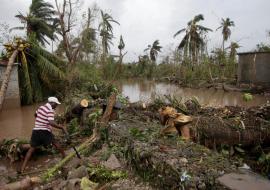CHTA President Urges New Initiatives to Combat Global Economic Crisis


Enrique De Marchena Kaluche, president of the Caribbean Hotel & Tourism Association, is urging the Caribbean to “strengthen international advertising and programs” to counter the effects of the tourism reductions seen across most of the region. He made these remarks during a keynote address to the graduating class of the School of Hotel Management and Tourism at the San Pedro de Macoris-based Eastern Central University (UCE) in the Dominican Republic.
De Marchena Kaluche, a key figure within the Dominican tourism and real estate industries in addition to his role at CHTA president, offered insight into current tourism industry developments and an overview on what is being done by various governmental bodies and private-sector organizations within the Caribbean region to combat the negative effects of the global economic crisis.
“There is no doubt that, as far as numbers of tourists and the spending power of American visitors are concerned, the American market is the main source of tourism for the Caribbean,” said De Marchena Kaluche during his third appearance at the university.
“Dominican Republic, Cuba and the Mexican Caribbean, to a great extent – and Jamaica, to a lesser extent – are exceptions to this. However, the rest of the Caribbean depends heavily on the American market,” De Marchena Kaluche noted.
“The reduced spending power of the American family and the uncertainty weighing on the minds of everyone has led to a reduction in potential arrivals to the region,” said De Marchena Kaluche, suggesting that the Caribbean “strengthen international advertising and programs to attract investments by latching onto innovative and creative ideas” to counter the effects of the tourism reductions seen across most of the region.
Citing tourism increases in Cuba and Jamaica as the rare exception, De Marchena Kaluche explained that the “reality for the rest of the Caribbean is more like the Bahamas rather than Cuba. In other words, islands such as St. Lucia, St. Kitts, Bermuda, Barbados, Grenada and others, suffered a 10 percent or more decrease in the influx of tourists.”
He also touted “tax amnesty for arrears” in St. Kitts and Nevis with “no penalties.” De Marchena Kaluche applauded St. Vincent and the Grenadines for allowing “electricity consumption for hotels at the same price as domestic users, reduced income tax from 30 percent to 20 percent for hotels applicable to 2009 income and 20 percent income tax for yacht operators.
Speaking of his native Dominican Republic, De Marchena Kaluche advised of strategies announced by Secretary for Tourism, Francisco Javier Garcia, including plans to “double the investment in advertising, promotion and public relations, [open] new offices in Europe, the U.S. and Latin America, work with emerging markets and promote a regional communications program in the Caribbean.”
He also spoke of greater efforts to facilitate investments, including “the elimination of bureaucratic hindrances to speed up the processing of new projects,” specifically noting the creation of “a new unit for processing new projects combining elements from the Dept. for Tourism and the Dept. for the Environment.”
He further advised of investments for infrastructure improvements, such as the improvement of roads in major tourist hubs by July 3, 2009 and efforts to “fight poverty in Punta Cana [with] a program to build housing utilizing private companies in exchange for lands with great tourism potential.” He also spoke of heightening local awareness with “a communications program to increase local self esteem and appreciation for tourism.”
Looking back at the overall picture in the Caribbean region, he said “the comparative analysis is revealing in so far as each Caribbean island has taken steps tailored to meet their individual needs. However, it should be noted that they all have common elements: reduction in taxes, job protection, social aid, increased advertising budgets and even the issue of electricity, which has an enormous impact on costs for the majority of the Caribbean islands, negatively influencing the competitiveness of our tourism product.”
He noted that the “Caribbean is diverse, but at the same time, it is an intensely interconnected market,” but criticized the absence of flight connections within the Caribbean as well as “restrictive immigrations policies, the latter likely to be the topic of debate at the next CARICOM Heads of State Meeting.”












